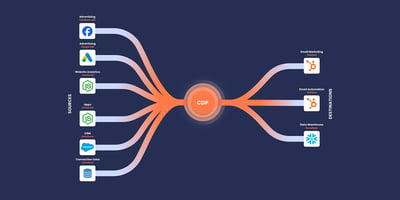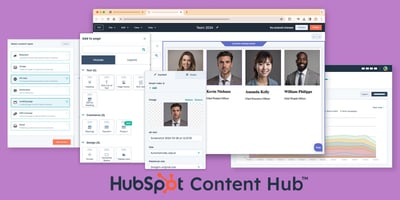If you're considering migration from any other CRM into HubSpot or simply starting on a journey with HubSpot's mighty CRM, this guide is a great start to understand the foundational terminology and tools that make up this system.
HubSpot is user-friendly, but learning its architecture can make all the difference in how you apply its full capacity.
Think of HubSpot as a house, with all the different types of objects in the home being separate rooms. Each one of these properties with the objects reflects the bricks in each room of the house, and the data points themselves represent the bricks that build them.
The Four Main Rooms of Your HubSpot Home: Core Objects
There are four keystone items in HubSpot: Contacts, Companies, Deals, and Tickets, which make up your CRM. Consider the four mentioned elements to represent the basic rooms of your house, each playing its role and character.
Contacts

Contacts are the people you interact with—think of them as the main residents of your house. Each contact record stores details like name, email, and phone number, filling the rooms with the essential elements that bring them to life. The specific data points like birthdate, job title, or company are like the bricks that build these rooms, giving your house the structure it needs.
Companies
Companies are like the houses themselves, hosting all the residents (contacts) linked to a specific organisation. These houses are built with company data like industry, size, and location, making each home distinct.
Deals

Deals represent the opportunities you’re working on with each resident in your house. They’re like new extensions you add to your home as your relationship grows—each new room is built with deal value, stage, and close date.
Tickets

Tickets are like maintenance tasks or repairs needed within your house. They handle the support requests or issues that pop up, ensuring your home stays in good shape. Each ticket's details, like issue type, priority, and status, are the materials that keep your house running smoothly.
You will find that all the items and properties are linkable to one another in the system of HubSpot CRM to ensure that your system keeps the records in an organised and effective manner.
Understanding HubSpot Properties: Laying the Bricks that Make up Your Rooms
In HubSpot, everything has properties - these are like the rooms that make up each house. Much as a house requires rooms to be functional, so do your CRM objects need properties to store information. Properties are made up of data points, the bricks that build and define these rooms.
Properties
.png?width=2420&height=1370&name=Screenshot%202024-10-04%20at%2012.58.02%20(1).png)
Specific fields of information within each object, such as a Contact’s Email or a Company’s Industry. Each property is like a room that serves a distinct purpose within your CRM house.
Data Points
The specific values within each property—like a Contact’s actual email address or a Deal’s actual value. These are the individual bricks that build up each room, making it functional and useful.
Custom Properties
Tailoring Your Space. While HubSpot provides standard properties, you also have the option to create Custom Properties to suit your specific needs, much like adding bespoke rooms or features to your house. These allow you to capture unique data relevant to your business operations, enabling a CRM structure that reflects your organisation’s nuances and needs.
Account and Setup: Laying the Foundation of Your HubSpot Home

The features under Account and Setup are the bedrock upon which your entire HubSpot home is founded, figuratively and quite literally; these settings are so necessary to be corrected for a well-organised and compliant environment one eventually will work in.
GDPR
A European Union (EU) law that safeguards the personal data of EU and European Economic Area citizens and residents. It sets the standards for data collection and processing by businesses. HubSpot provides tools and settings to help ensure compliance with GDPR and similar data privacy laws globally.
Integration
A connection between HubSpot and another app, such as Slack or Salesforce, allowing data to flow between systems to streamline processes and centralise information.
Marketplace
App Marketplace: An online directory of apps that integrate with HubSpot, ranging from free to paid options, designed to extend the functionality of your CRM.
Asset Marketplace
A collection of modules, templates, and themes that you can use to enhance marketing emails, landing pages, website pages, and blogs within HubSpot.
Limiting Access
A feature that enables you to restrict access to certain HubSpot tools and assets, ensuring that only specific users or teams can view or modify them.
Permission Sets
Pre-defined configurations of user permissions that ensure consistent access levels across your team, helping to manage who can see and do what within your HubSpot account.
Teams
Groups of users within your HubSpot account that help with organisational structure, reporting, and managing access to various tools and resources.
Branding Setup
Branding in HubSpot is like the aesthetic design choices that make your CRM home uniquely yours. It allows you to set up logos, colours, and company details across emails, landing pages, and other customer-facing elements, ensuring brand consistency and a professional appearance in all communications.
Account Settings
These are the master controls of your CRM home, where you can manage company details, default properties, currency, and time zone settings. Account settings help tailor your HubSpot environment to fit your specific business needs and operational preferences, making sure everything aligns perfectly with your company’s way of working.
Managing Your HubSpot CRM: The Living Spaces
Consequently, the CRM features of HubSpot act as the primary living areas in your home, whereby each engagement and relationship in respect to contacts, companies, and deals is carefully managed and fostered. This is where your data lives, evolves, and works towards supporting your goals.
Activity
Any action taken on CRM records, including notes, emails, tasks, meetings, calls, and messages, which are all logged to keep a comprehensive history of interactions.
Activity Feed
A real-time feed that shows interactions such as email opens, document views, and meeting bookings, helping sales and service teams stay updated on engagement.
Association
The relationship between records, such as linking contacts to companies or deals, providing context and a complete view of interactions across different CRM objects.
Deal Score
A numerical value indicating the likelihood of a deal closing, used to prioritise sales efforts and predict revenue.
Pipeline
Visual representations of the stages that deals or tickets move through, used to track progress, identify bottlenecks, and forecast outcomes.
Property
Fields that store specific data points for each object (e.g., contact, company, deal), which are crucial for segmenting, reporting, and personalising interactions.
Saved View
Custom filters created to segment records based on property values, helping users focus on specific subsets of data within their CRM.
Ticket
CRM records used to track customer issues and support requests, integral for managing and improving customer service processes.
Automation: The Smart Systems of Your HubSpot CRM Home
HubSpot is very similar to the smart systems in your CRM home that is, making things easier and ensuring everything runs okay without you having to continually tell them what to do. These features are the brains behind your operations. This eliminates repetition, and moves and keeps your contacts on personalised journeys with precision and efficiency.
Workflow

HubSpot’s powerful automation tool automatically enrolls records based on specific triggers and executes a series of actions to support marketing, sales, or service processes.
Actions
These are the functions that execute when a record enters a workflow or when a visitor interacts with a chatbot. Actions drive the automated processes within HubSpot’s workflows and bots.
Action Logs
These logs provide a historical record of events that have occurred as a result of actions taken within workflows, offering a clear view of automation outcomes.
Branch

A workflow action that directs records down specific paths based on set criteria, allowing for conditional automation tailored to different scenarios.
Delay
A scheduled pause between actions in a workflow, used to time sequences or follow-ups appropriately.
Enrolment Triggers
Specific conditions that automatically enrol records into a workflow when met, initiating the automated processes.
Fallback Email
A temporary email provided by HubSpot that allows you to use certain tools, like ticket automation, before connecting your own team email.
Enrolment History
A log that tracks which records have been enrolled in a workflow, useful for auditing and troubleshooting automation sequences.
Suppression List
A list that prevents certain contacts from being enrolled in a workflow, helping to manage who receives automated actions.
Un-enrolment Triggers
Conditions that automatically remove records from a workflow when specific criteria are met, halting their progress through automation.
Webhook
A workflow or bot action that sends data from HubSpot to another web application, allowing for advanced integrations and notifications.
Chat Features: The Front Desk of Your CRM
Chat functions in HubSpot as the front desk of your home CRM, offering a warm point of entry where visitors can ask questions and get help in real-time by connecting with your team. These tools ensure that your customer service is always accessible, responsive, and aligned with the needs of your visitors.
Chatflow

Chat widgets that you can add to your website. There are two main types:
- Bot: A series of pre-set actions in a chatflow that guide visitors through a structured conversation path until their inquiry is resolved or they are connected to a team member.
- Live Chat: Allows real-time conversations between website visitors and your team, facilitating immediate support and engagement.
Channel
Represents different ways for users to contact your team, such as email, chat, form submissions, or Facebook Messenger, all managed within your HubSpot conversations inbox.
Customer Portal
A secure, logged-in area where customers can view, open, and reply to their support tickets, offering transparency and self-service options.
Inbox
The central location for all conversations from connected channels, where you can view and manage ongoing interactions, reply to messages, and create tickets.
Targeting Rules
Criteria that control which chat flows or pop-up forms appear to visitors based on URL, visitor behaviour, and other parameters, enabling personalised engagement strategies.
Team Email
A shared email address connected to your inbox that allows multiple users to manage communication with contacts, distinct from personal email addresses.
Commerce Tools: Streamline Sales with HubSpot
The commerce features in HubSpot are the cash register of your CRM home, designed to help you make smooth transactions of payments and management of products or services. These tools will help streamline all of the processes involved in selling, making it a walk in the park to manage everything from quotation to payment collection.
HubSpot Payments
HubSpot’s integrated payment processor, enabling you to collect payments directly through quotes, invoices, and payment links. Alternatively, you can connect Stripe as a payment processor.
Invoices
A tool to issue digital invoices and collect payments via HubSpot Payments or Stripe, streamlining your billing processes.
Quotes
Create shareable web pages that provide pricing information and allow customers to make payments directly through HubSpot Payments or Stripe.
Payment Links
Direct links that customers can use to make one-time or recurring payments for goods and services, simplifying the purchasing process.
Products
Manage the goods or services you sell through HubSpot’s product library, making it easy to track and include in quotes and deals.
Subscriptions
CRM records that track recurring payments, processed through HubSpot Payments or Stripe, including details on terms, contacts, and deals associated with the subscription.
Sales Tools: Your HubSpot CRM's Sales Office
All these sales tools in HubSpot resemble the busy sales office in your CRM, where deals are groomed, meetings scheduled, and all the interactions of customers tracked meticulously. You should assume that these features are here to support your sales team to be able to easily manage prospects and close deals.

Calling
Calling is like the direct phone line in your sales office, allowing sales reps to contact prospects directly from the CRM, log calls, and track outcomes. This feature streamlines communication, ensuring that every conversation is documented and easily accessible for follow-up.
Document
Documents are the sales materials stored in your CRM home’s filing cabinet, ready to be shared with prospects. Uploaded to HubSpot’s document tool, these files can be sent to contacts, tracked for engagement, and used to advance deals, providing your team with valuable insights into how prospects interact with your content.
Meetings
Meetings act as the appointment calendar on your sales team’s desk, making it simple for prospects to book time with your team based on availability. This scheduling tool eliminates the back-and-forth of setting up meetings, allowing your team to focus on building relationships and advancing deals.
Prospecting
The prospecting workspace is like the central command centre of your sales office, bringing together all the daily tasks, emails, and outreach efforts in one organised location. It helps sales reps efficiently manage their workflow, ensuring that no lead falls through the cracks.
Task
Tasks are the to-do lists pinned up on the wall of your sales office, keeping your team on track with reminders for follow-ups, calls, and other critical actions. By assigning and managing tasks within the CRM, your sales reps can stay focused and productive, driving deals forward with clear, actionable steps.
Email Integration
Email integration allows sales reps to connect their email accounts to HubSpot, enabling the logging and tracking of sales emails and activities directly within the CRM. This integration ensures all communication is automatically recorded, providing a complete view of interactions with prospects and helping to streamline sales processes.
Marketing Tools: The Décor and Style For all Those Looking at Your Home
HubSpot's all-in-one marketing tools enable your team to attract, engage, and delight customers; fueling growth at every stage of the customer journey with a connected suite of tools that power actionable, data-driven strategies. This will also be helpful in creating and managing campaigns, personalisation of content, and measuring the overall effectiveness of the marketing effort on one integrated platform.
Ads
HubSpot’s Ads tool allows you to connect ad accounts from platforms like Facebook, Google, or LinkedIn, enabling you to create, track, and report on ad campaigns directly within HubSpot. This integration simplifies the management of your advertising efforts, providing insights that help optimise campaigns for better ROI.
Call-to-Action (CTA)
CTAs are interactive buttons or links designed to prompt visitors to take specific actions, such as downloading a guide, signing up for a demo, or subscribing to a newsletter. These elements are critical for guiding users through the buyer’s journey and converting them into leads.
Form
Forms are essential tools for capturing information from your website visitors, which is then stored in HubSpot’s CRM. By collecting data through forms, you can segment and nurture leads more effectively, tailoring your marketing efforts to meet the specific needs of your audience.
Marketing Email
The Marketing Email tool in HubSpot allows you to create and send targeted emails that promote your content, engage your audience, and drive conversions. With features like A/B testing, personalisation, and detailed analytics, you can refine your email strategies to maximise impact.
Smart Content
Smart Content adapts dynamically based on the characteristics of the viewer, such as their location, device, or data stored in your CRM. This feature allows you to deliver personalised experiences on your website and in emails, enhancing engagement by presenting the most relevant content to each visitor.
Landing Pages
HubSpot’s Landing Page tool enables you to create high-converting pages designed to capture leads and drive specific actions. With a drag-and-drop editor, built-in SEO recommendations, and A/B testing capabilities, you can optimise your landing pages for performance and align them with your overall marketing strategy.
Content Hub
The Content Hub in HubSpot provides a centralised location for managing all your content assets, including blog posts, website pages, and landing pages. It offers tools for creating, organising, and optimising content, ensuring consistency and alignment with your brand’s messaging and goals.
Service Tools: Maintenance and Upkeep of Your HubSpot CRM

The service tools that HubSpot provides are expected to get your customer support to a more positive platform through the provision of necessary resources and insights into delivering excellent service. It enables you to gather precious feedback, equips customers with self-service options, and helps in smoothening your support processes in developing stronger, more satisfying customer relationships.
Feedback Surveys
HubSpot’s Feedback Surveys allow you to gather crucial customer insights through various types of surveys, including Customer Satisfaction (CSAT), Net Promoter Score (NPS), and Customer Effort Score (CES). These surveys help you measure customer satisfaction, loyalty, and the ease of their support experiences, providing actionable data to improve your service offerings.
Knowledge Base
The Knowledge Base is a self-service library of articles, guides, and FAQs that helps customers find answers to their questions independently. By providing a comprehensive resource that addresses common issues, the Knowledge Base reduces the volume of support requests, freeing up your team to focus on more complex customer needs and enhancing the overall support experience.
Inbox
The inbox is the central communication hub at your CRM home’s help desk, where all messages from connected service channels—such as chat, email, and social media—are gathered. It allows your team to manage conversations, respond to customer inquiries, and create tickets, ensuring that all customer communications are handled efficiently in one place.
Playbooks
Playbooks act as the training manuals or quick-reference guides at your CRM help desk, providing your team with ready-to-use scripts and best practices when engaging with customers. These resources ensure that your team delivers consistent, high-quality support, tailored to address common questions and scenarios.
Final Thoughts
Starting from the foundational objects such as Contacts, Companies, Deals, and Tickets to dynamic functionalities related to the mechanics of automating actions, marketing activities, and services, HubSpot has all the products to bring your business processes under one synchronising environment.
This investment of time in learning and configuring your HubSpot environment will pay off with an organised, scalable, and efficient CRM that directly falls in line with your business goals. Keep your CRM 'house' neat and clean, and it will be a good base to nurture customer relationships for sustained growth.





